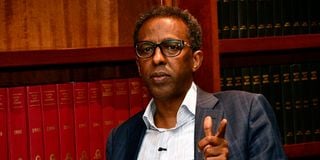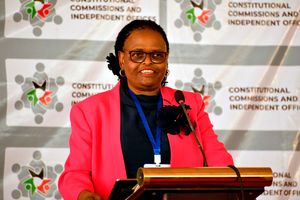LSK sues Supreme Court for denying Ahmednassir audience

Senior Counsel Ahmednasir Abdullahi.
What you need to know:
The apex court sent a letter addressed to Mr Abdullahi stating that he together with employees of his law firm will not be granted audience.
The LSK says the decision is unconstitutional, unreasonable and contrary to the statute.
Law Society of Kenya (LSK) had sued the Supreme Court and its seven judges over the ban imposed on Senior Counsel Ahmednasir Abdullahi and his law firm from appearing before the apex court.
Rules of natural justice
In the petition at the High Court, the LSK says the decision goes against the rules of natural justice as Mr Abdullahi and other advocates practicing at his law firm were not given an opportunity to be heard despite the seriousness of the decision.
“Pending the hearing and determination of this application and the petition, this court do issue a conservatory order, quashing the decision by the Supreme Court dated 18th January 2024 denying audience the 1st interested party…,” the LSK pleaded in the petition.
Also read: Why the judiciary is on trial, again
The apex court on January 18 sent a letter addressed to Mr Abdullahi stating that he together with employees of his law firm, persons holding his brief or acting on his instructions will not be granted audience over his persistent attacks against the leadership and judges of the court.
Rescued themselves
The judges made good their threat their threat on Tuesday when six judges recused themselves from hearing a case before them as one of the respondents was represented by Mr Abdullahi.
Unconstitutional and unreasonable
The LSK says the decision is unconstitutional, unreasonable and contrary to the statute.
The lawyers’ umbrella body says the top court acted unilaterally as the judge, jury and executioner as it did not give the Senior Counsel or any of his employees an opportunity to be heard, despite the serious nature of allegations and its decision.
“It (the court) did not consider the harm that would be occasioned to Ahmednasir Abdullahi SC or his firm’s employees, clients and their right to choose counsel of their choice,” said Ms Florence Muturi, LSK’s chief executive officer.
Permanent ban is blanket in scope
Through lawyer Gitau Singh, the LSK said the permanent ban is blanket in scope and final yet it is livelihood-affecting penalty for both Mr Abdullahi, his employees and their clients.
“There is actual and obvious bias by the Supreme Court in coming to its decision,” he said, adding that it was calculated at punishing the advocate, his employees and clients (current and prospective) rather than to rectify any supposed misunderstanding generated by his posts.
The LSK says the Supreme Court has, in its armory, tools with which to punish advocates for their unbecoming conduct, after following the due process including contempt of court but which the court failed to use.
No evidence
“There is no evidence to show that the publications by Ahmednasir Abdullahi SC undermined the confidence of the parties in the suits and of the general members of public in the administration of justice or in the judges of the court in discharging their duties,” Ms Muturi said in an affidavit.
She said that a democratic country requires pluralism, tolerance and broadmindedness, which the Supreme Court failed to exercise.
Citing the case in which the judges recused themselves, the LSK said the family of the late Noah Chelugui had already paid or are legally bound to pay for the legal services to the law firm and they will be adversely affected by being compelled to change advocates midstream.
Defending the embattled lawyer, the LSK said it was aware that when corruption was rife in the 1990s and early 2000s, it was Mr Abdullahi who almost singlehandedly took on the task of naming and shaming judges, resulting in the eventual dismissal of more than 20 judges.
The LSK has named 10 advocates practicing in the law firm as well as the judges of the Supreme Court as interest parties.





